11 High Paying Marine Careers
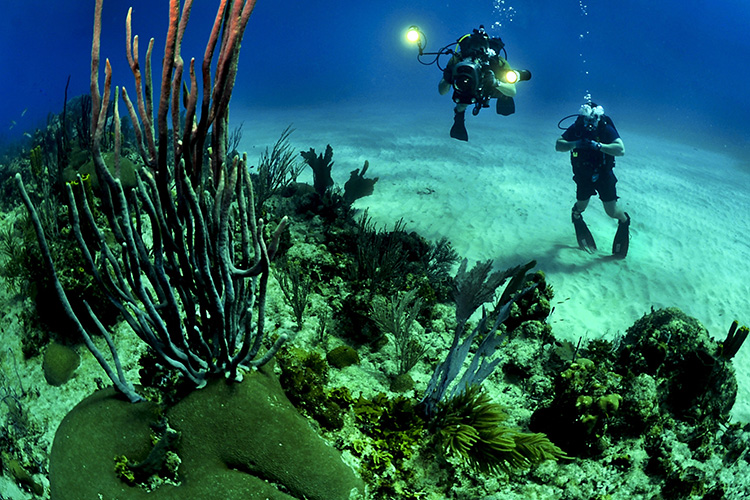
We have already discussed a wide range of careers in the marine industry that one can opt for. The marine industry is currently in great demand and offers some of the most rewarding and sought-after marine careers in the world.
The modern world provides great opportunities for the generation to choose their careers. Gone are the days when the only career options available for the youth were in the field of mathematics or science. Nowadays, there are many careers in designing, communication, arts, and other technologies that are just as well-received and respected as careers in engineering or medical science.
According to a recent study, India offers more than 3000 different career options across various fields. Countries like China have more than 30,000 such options. Other than this, many more opportunities are coming up every single day.
One such field is the marine industry which provides a variety of career opportunities of various kinds. They are especially different and better paying than most of the jobs that people normally opt for.
This article talks about the different career options that the marine world provides. The following are some of the many career options available in this field. They have been briefly described.
Top High Paying Marine Careers
1. Ocean Engineering
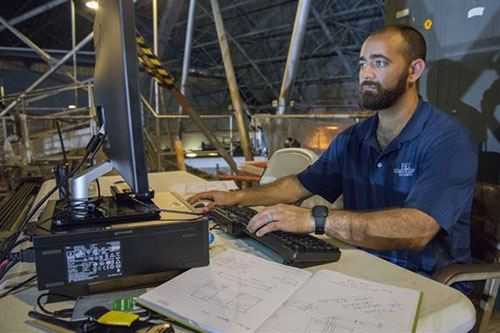
You can choose this marine career as a starting point as it enables you to explore everything about the oceans. You are limited only by your technical skills and can really expand your horizon if you wish to. Ocean engineering involves the studies of boats, ships, oil rigs, and other marine vessels. It is also known as marine engineering. As an ocean engineer, you are supposed to familiarize yourself with the ocean policies and the various navigational limitations that are currently faced by the navigators.
Various new products including advanced technological devices aimed at minimizing the limitations are being developed all over the world. As an ocean engineer, you get to contribute to their research and development. You get to improve and develop the marine navigation and communication. Engineers for working on the designing and conceptualizing of an unmanned underwater vehicle is something that is quite sought after in various such companies. You might make yourself useful in this area too.
2. Marine Biology
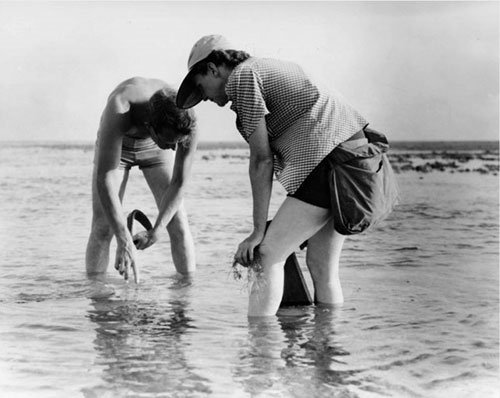
If you are more into biology, then marine biology would be a more sensible career option for you. Marine biology is the science that deals with the study of marine life and the organisms that live in the sea. Marine biologists are required for several purposes like reporting, researching, Marine Environmental Management, or even shipbuilding. They are also sometimes required for commercial interests and TV programs like those on Discovery Channel and National Geographic.
The career has vast opportunities as it is limited by only the oceans and its diversity. As a result, you get to travel a lot as you are required to carry out your observations across various parts of the world. This is understandable as the diversity of the marine life forms is as vast as the oceans themselves and the procedure of the research should be such that nothing is omitted if possible. As a marine biologist, you should not only have the required qualifications but also a good amount of on-site experience. However, if you are not comfortable with the idea of traveling constantly you can settle for teaching the course instead and submitting crucial research papers that add to the value to the field of study. These studies can be done in marine museums too.
You are however not expected to study in detail the marine animals and like the whales and other mammals because that falls under the purview of the marine zoologists. Your concern should be more focused on the biology aspect of the water.
However, it is important to note that this is not one of the highest paying marine careers. So, if you were looking for a lucrative career opportunity then you should probably look elsewhere. This will be a test for your passion for marine life as there will be nothing else to satisfy you or motivate you to keep going in this marine career.
3. Marine Mammal Trainer
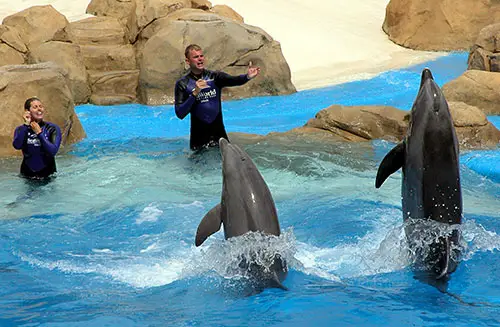
If you love animals and enjoy playing with them and feeding them this is one of the best marine career options for you. You will get to work with dolphins, whales, seals, sea lions, walruses, and other marine mammals. It will be your duty to see to it that they are fed properly and that they remain healthy.
Apart from good medical care you also need to ensure that they are in proper aquatic environments and structural habitats. They also need adequate social and behavioral opportunities.
To become a Marine mammal trainer, one should have a high school diploma, a degree, experience in volunteering, and experience doing an internship and be SCUBA certified. Most of the trainers have degrees in either psychology, marine biology, or animal behavior.
This is one of those jobs where experience is valued more than qualification as marine mammals are living things and they need to have a connection or a friendship with their trainer.
To get the job you need to be well aware of animal biology, behavior, water chemistry, nutrition, veterinary medicine, marine ecology, and other related fields. In addition to getting trained in these fields if you happen to have experience in working at zoos, oceanariums, veterinary hospitals, wildlife rehabilitation centers, or animal shelters, you can get an edge over the competition.
4. Marine Archaeologist
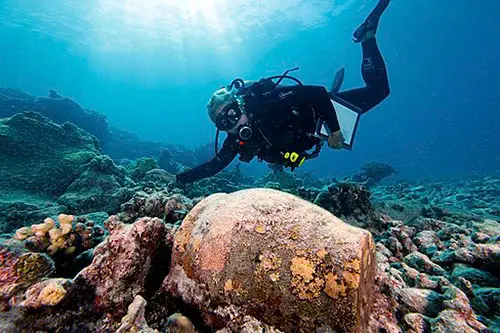
Marine archaeology is a branch of archaeology that specifically deals with the study of the history of humans with reference to the sea. It is also known as maritime archaeology. It mainly involves studying physical remains of vessels, show site facilities, human remains, submerged landscape cargos, and port-related structures. You might be familiar with the term archaeology. It deals with digging up the lost and forgotten.
The seas and the oceans have just as much to offer us if not more. The responsibility of a marine archaeologist is tremendous because they not only dig up the past in the form of ships that have sunk centuries ago or other such long lost witness to history but also help in their preservation. Over the years several excavation works have been carried out across the world and various artifacts have been brought out of the water and exhibited for the common mass to feed their amazement.
The oceans have drowned civilizations and the only faint traces left of them are there to be explored by marine archaeologists. They unearth the stories that get suppressed by the waters and while doing so they need to be extremely careful as to not to cause any disturbance in nature as that will lead to a catastrophic end not only for the present generation but also for the one to come. Hence archaeologists need to be extremely responsible.
Marine Archaeology has its perks too. Just like land archaeologists you get to travel the world as you need to carry out your work in different exotic locations. And unlike the marine archaeologist, you get access to the underwater locations, where the common people are not lucky enough to find themselves in. You can get an undergraduate, post-graduate or a PhD in this field depending upon how interested you are in this field.
Read more: The History of Ships – An Insight into the Ancient Maritime World
5. Marine Researcher

If you don’t want to be sticking to a very niche marine careers and instead want to experience all that the marine life has to offer, then it would be a good idea to become a part of a marine researchers’ team and spend your days exploring the marine world and discovering its various secrets.
A Marine researcher is a person who studies the water bodies of the earth. He performs fieldwork and laboratory research as well. Marine researchers are required in numerous industries and organizations for studying the ocean, sea, aquatic environment, ecosystems, and organisms. A marine biologist, a marine ecologist, or even a marine archaeologist can qualify as a marine researcher.
6. Oceanographer
Oceanography may be defined as the study of the physical and biological aspects of the ocean. It is an extremely vast area that comes under geoscience. If you intend to pursue this as a career you will need to study multiple disciplines to combine that knowledge for a holistic understanding of how the ocean works. The topics that need to be covered include ecosystem dynamics, ocean currents, waves, and geophysical fluid dynamics, plate tectonics and the geology of the seafloor, etc.
As a trained oceanographer you can apply for the job of an environmental educator and share your knowledge with people. Making them understand the concept of marine environmental safety would be a part of that job. Else you could choose to stay immersed in the study of the various aspects of marine life.
Read more: 6 MINDBLOWING Facts About Waterspouts At Sea
7. Aquatic Veterinarian
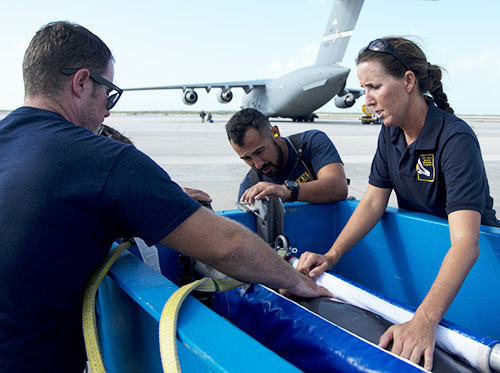
This is quite similar to the marine mammal trainer except for the fact that you get to look after a wider range of animals. Naturally, your love for animals is a common element in both the jobs. As an aquatic veterinarian, you get to play with the amazingly friendly and intelligent dolphins but also get to take care of the large whales and walruses. Aquatic veterinarians are people that specialize in the health management of marine or aquatic animals. They are licensed or certified professionals who treat aquatic animals like fish, mammals, turtles, etc.
The general duties of an aquatic veterinarian are to perform basic exams and evaluations of the animals, giving them vaccinations on time, taking samples of blood and other fluids, prescribing medicines, observing and evaluating the behavior, performing surgeries if necessary, treating wounds, taking X-rays and supervising veterinary technicians.
Aquatic veterinarians are required in aquariums, zoos, museums, and marine parks. They are also required by marine mammal trainers and marine biologists.
To become an aquatic veterinarian, one must graduate with a Doctor of Veterinary degree and then pass some national exams to be certified. People may also require several years of training, testing and assisting professionals in order to become an aquatic veterinarian.
Among all the marine careers listed, a veterinarian is probably the most satisfying job.
8. Scuba Diving Instructor
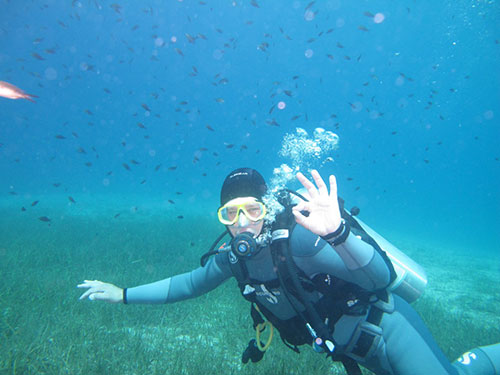
A Scuba Diving instructor or a diving instructor is a person who trains underwater divers. They could be free divers, technical divers, recreational divers, or even diving for military or commercial purposes.
Another interesting career that is worth taking a look at is that of a scuba diving instructor. As a scuba diving instructor, you get to travel the world. To become a scuba diver instructor, you will first need to be a certified open water diver for a minimum period of 6 months, rescue diver, divemaster, and Emergency First Response Instructor (CPR and first).
You must log 100 open water dives, and successfully complete the instructor development course. The IDC is usually a 10-day course (minimum). After these requirements have been fulfilled you become qualified to sit for the instructor evaluation (IE).
This is again going on for 2 days and includes presentations, mock instruction situations, multiple written exams, etc. The kind of money that you can make as a scuba diving instructor is a little tricky to assess because it all depends on the kind of work you find. You can start working at resorts and liveaboards.
They usually pay good money and also you can make a lot of money from the tips. Else you can work in high-end dive operations that go on for a few months. However, it is worth noting that the sum is never a drastic amount. However, divemasters get paid less than instructors but can compensate this by expanding his skill-set a little bit.
E.g. people can also work as an underwater photographer and/or videographer. Since this kind of job enables one to travel the world there is much experience that he can share with something like a blog. A good example of this is 1dad1kid.com where Talon relates the adventures, he goes on with his son Tigger.
9. Underwater Videography and Photography
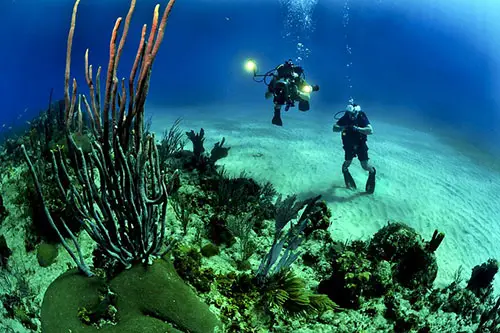
If you are a really creative person and have a passion for both photography or videography and diving, then this is a perfect job for you. Equipped with your camera you have the power to capture shots that are hardly accessible to the common man.
Read more: Is Career In Underwater Photography Lucrative?
You can create some magical stories with your underwater photography and videography skills as the underwater is a world in its own, quite alien to the people who are not divers themselves. There are certain organizations like PADI and SSI that provide courses that hone your underwater photography and videography skills.
But before ‘diving’ into this career path, you should be aware that this job would require you to handle very expensive and extremely delicate equipment including the camera. So, if you are a clumsy person you might want to give it a second thought before taking the ‘plunge’.
10. Marine Environment Economist
As you might already be aware the marine environment is at constant risk and several efforts are being made to counteract the deterioration. Governments with the help of private organizations are continually working towards saving marine life managing the resources in a sustainable way. If this kind of work interests, you then you should definitely build your career as a marine environment economist.
A Marine environment economist is a person who deals with the study of the environment of the ocean and all the ecological factors related to it. This involves the study of a relationship between the economy and the environment. A marine environment economist studies the economics of natural resources that come from the ocean, how to use them to our benefit but at the same time not harm the environment and ensure proper disposal of waste products in order to maintain sustainable development.
Read more: Oil Spill and their impact
11. Social & Policy Science
Social & policy science encompasses human psychology, sociology, geography, anthropology, and other allied streams together so that policymakers can make decisions and formulate policies related to ocean and coastal areas.
Oceans impact not only the waters but the coastal areas and their inhabitants. Before taking any decision, there has to be an assessment on its impact on human life in and around the oceans and coasts.
Social scientists will study, research and create policies for better ocean, coasts and resource management
Conclusion
Whatever your call may be the oceans have an answer to it. Each of these jobs though interesting are extremely demanding in times of qualification and/or experience. Thus, you will be investing a lot of time in any of the careers you choose from the above list. So before choosing a career path make sure that it is truly what you want to do.
To understand that imagine yourself in a situation where you have to work in that field all your life and won’t be given a pay. Instead, you would only be given the bare means of survival. Would you still be happy with the job? If your answer is yes, then you should definitely choose a career path as soon as possible and start working towards realizing your goal.




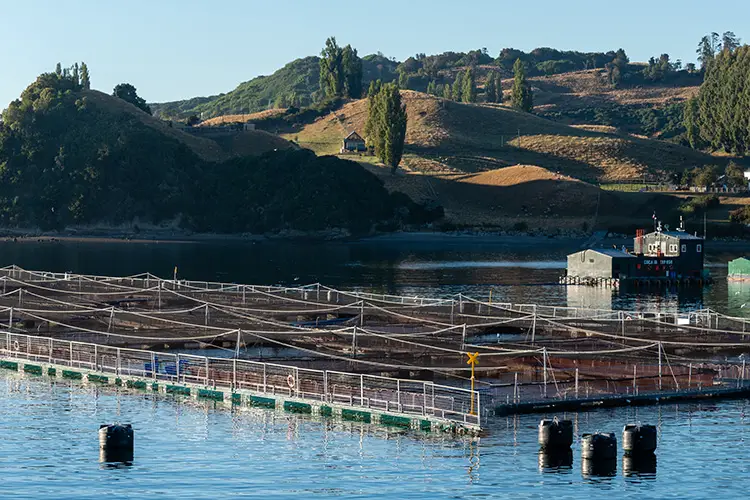
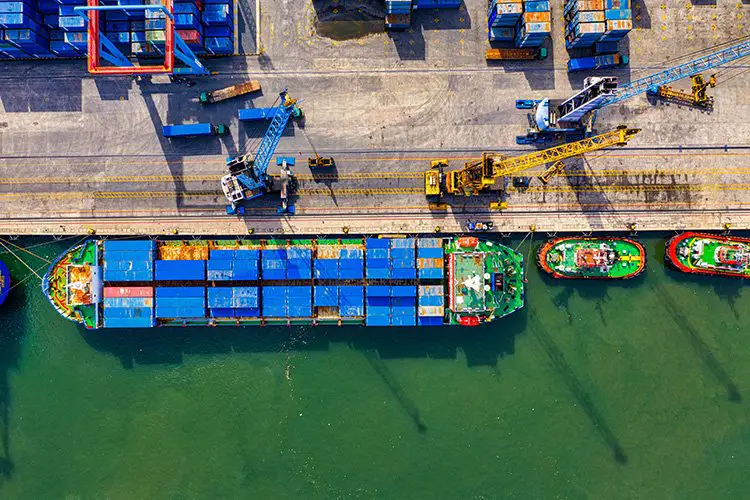
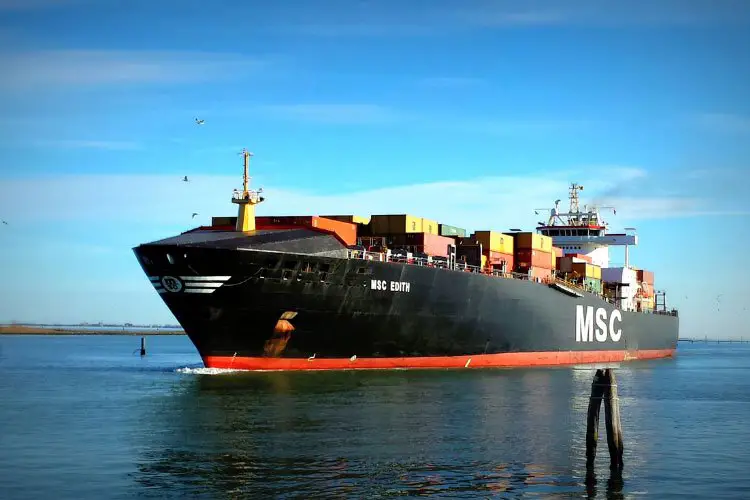

Underwater welding Course admission gaych aahe